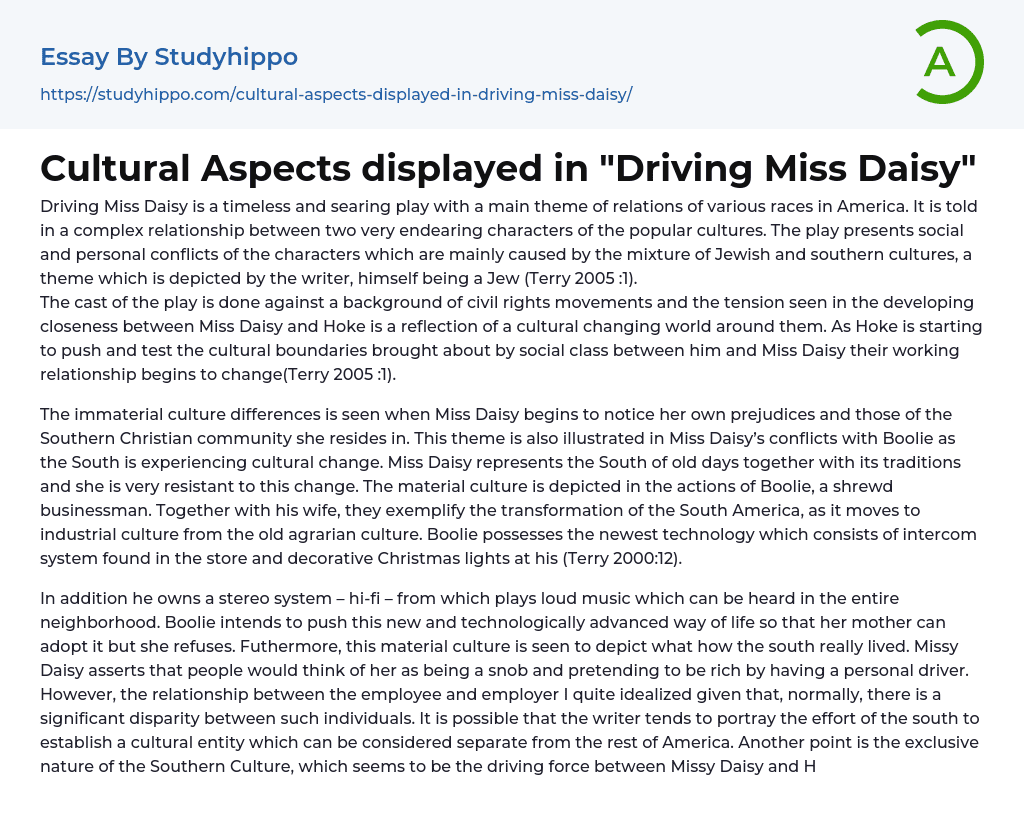Driving Miss Daisy is an enduring and powerful play that explores the interplay of race relations in America. The story revolves around a deep and intricate bond between two beloved characters from different backgrounds, showcasing the complexity of their dynamic within popular culture.
The play explores the social and personal conflicts of the characters, which arise from the blend of Jewish and southern cultures. The writer, who is Jewish himself, depicts this theme (Terry 2005:1). The play is set against the backdrop of civil rights movements. The growing closeness between Miss Daisy and Hoke mirrors the changing world around them. As Hoke begins to challenge the cultural boundaries dictated by social class, their working relationship evolves (Terry 2005:1). Miss Daisy starts to recognize her own prejudices and those within the Southern Christian community she lives in, highlighting the intangib
...le cultural differences. This theme is also evident in Miss Daisy's conflicts with Boolie, as the South undergoes cultural transformation.
Miss Daisy is a symbol of traditional Southern culture and is resistant to change. Boolie, a cunning businessman, represents the shifting values of the South as it transitions from agrarian to industrial. He possesses modern technology like an intercom system, decorative Christmas lights, and a hi-fi stereo that plays loud music. Boolie tries to encourage his mother to embrace this new way of life, but she refuses.
The material culture is believed to accurately represent the South's true lifestyle. Missy Daisy, having a personal chauffeur, may be seen as stuck-up and pretending to be wealthy. Nevertheless, it is crucial to recognize that the employer-employee relationship is idealized with a noticeable social status difference. The author aims to showcase the South'
endeavor to establish a unique cultural identity distinct from the rest of America. Additionally, another emphasized aspect is the exclusive nature of Southern Culture, which appears to bring Missy Daisy and Hoke together.
According to Terry (2000:12), despite her haughty attitude towards her driver, Miss Daisy and other Jewish characters in the play are considered outsiders. The symbolic internationalism model is a sociological theory that can be used to illustrate the contrast between materialistic and non-materialistic cultures portrayed in the play. This theory helps explain why some individuals prioritize non-material aspects of culture while others value material possessions. In the context of the play, the sociologist would identify Miss Daisy as someone who values non-material aspects, evident in her desire to have a close relationship with her driver, Hoke, whom she considers her best friend (Terry 2000:12).
Symbolic interactionism examines Boolie's fascination with his new material culture, demonstrated by his attachment to the latest technology and possessions. Scholars would question if the Southern American intentionally cultivated a unique identity separate from the rest of the country, as well as investigate what motivates this identity.
References
- Terry, Miriam. 2005. "Driving Miss Daisy." New Georgia Encyclopedia. Retrieved 6 October 2016 (http://www.georgiaencyclopedia.org/articles/arts-culture/driving-miss-daisy)
- Terry, Miriam M.2000.”Hoecakes and Matzah balls: a marriage of cultures in the works of Alfred Uhry”. University of Georgia. 12. Retrieved 6 October 6, 2016 (https://getd.libs.uga.edu/pdfs/terry_miriam_m_200305_ma.pdf)
- Communication Skills essays
- Cross-Cultural Communication essays
- Effective Communication essays
- Greeting essays
- Intercultural Communication essays
- Interpersonal Communication essays
- Nonverbal Communication essays
- Orality essays
- American Culture essays
- Car Culture essays
- Cultural Differences essays
- Culture Shock essays
- Different Cultures essays
- Indian Culture essays
- Mexican Culture essays
- Mormon essays
- Pop Culture essays
- Popular Culture essays
- Ageism essays
- Cultural Diversity essays
- Discrimination essays
- Diversity essays
- Gender Discrimination essays
- Multiculturalism essays
- Oppression essays
- Peer Pressure essays
- Racial Profiling essays
- Sexism essays




